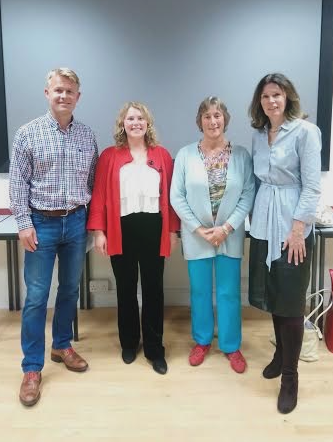- Stay Connected
 Abraham Lincoln
If given the truth, the people can be depended upon to meet any national crisis...
Abraham Lincoln
If given the truth, the people can be depended upon to meet any national crisis...
 Guildford news...
for Guildford people, brought to you by Guildford reporters - Guildford's own news service
Guildford news...
for Guildford people, brought to you by Guildford reporters - Guildford's own news service
Surrey Meeting Learns Why Group Wants Britain’s Law On Assisted Dying To Be Changed
Published on: 28 Sep, 2019
Updated on: 28 Sep, 2019

The meeting took place at the University of Surrey on Monday evening
By William Wilde
More than 50 people were welcomed to a meeting of the Dignity in Dying movement by national CEO Sarah Wootton, invited by the West Surrey branch chair Marie-Louise Papworth to her group’s fourth meeting, held at Surrey University on Monday (September 23).
Ms Wootton outlined the aim of Dignity in Dying to new members and other in the audience, which is to campaign for a law change that would allow assisted dying for the terminally ill, but only with proper safeguards and after a clear explanation of alternatives.

Dignity in Dying CEO Sarah Wootton (right) with local group leader Marie-Louise Papworth (second right) and attendees
At present, voluntary euthanasia and/or doctor-assisted suicide is legal only in Belgium, Canada, Colombia, Luxembourg, The Netherlands, Switzerland, Victoria, Australia and six US states (California, Colorado, Montana, Oregon, Vermont and Washington State).
Anyone in Britain who wishes assisted death usually travels to Dignitas in Switzerland, which is not connected to the UK’s Dignity in Dying.
Ms Wootton also pointed out that the group does not campaign for everyone wishing to end their life, such as those chronically ill and disabled, perhaps in pain but not dying. The law-change is sought only for terminally ill patients of proven sound mind.
Dignity in Dying’s national approach involves lobbying Parliament and MPs, engaging with the media and establishing visible local presences throughout the country.
There are now more than 50 local groups, and the West Surrey branch meets every month. Anyone is welcome to attend if they have been affected by the issue or whether or not they agree with assisted dying.
Ms Wootton also cited the UK’s legal grey area, where those helping someone travel to Dignitas in Switzerland may face legal repercussions. Ann Whaley was questioned under caution by police before helping her husband to Dignitas this year.
Last week, Mavis Eccleston was acquitted of murdering her terminally ill husband Dennis. Both took overdoses to end their lives but medics were able to resuscitate her although not her husband.
Dignity in Dying says the present law lacks clarity and leads to situations such as that of the Ecclestons. Apart from the threat of legal repercussions, the group also says few can afford the £10,000 it costs to use Dignitas.
UK law does allow VSED, voluntary stopping eating and drinking. The problem with that, Dignity in Dying says, is that VSED prolongs a way to end life which is usually excruciating.
Ms Wootton told the meeting: “I think that in years to come we will look back and think, ‘How could we let people suffer in that way?’ VSED is a really cruel, prolonged way of somebody taking control of their death.”
Amanda Dhar, who started campaigns for Dignity in Dying after the prolonged death of her terminally ill mother, says she thought at the time: “If she was an animal we’d all be put behind bars for allowing her to suffer like this.”












Recent Comments